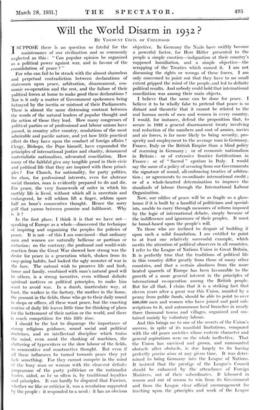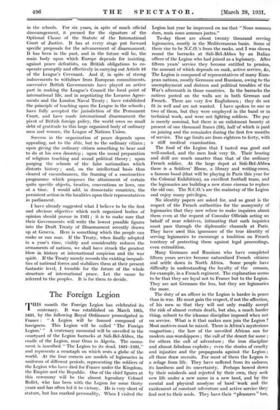Will the World Disarm in 1932?
BY VISCOUNT CECIL OF CIIELWOOD
ISUPPOSE there is no question so fateful for the maintenance of our civilization and so commonly neglected as this : "Can popular opinion be organized as a political power - against war, and in favour of the consolidation of peace ? "
For who can fail to be struck with the almost shameless and perpetual contradiction between declarations of statesmen upon peace, arbitration, disarmament, eco- nomic co-operation and the rest, and the failure of their political forces at home to make good these declarations ? Nor is it only a matter of Government spokesmen being betrayed by the inertia or mistrust of their Parliaments. There is almost the same distressing contrast between the words of the natural leaders of popular thought and the action of those they lead. How many congresses of political parties or of professional and labour unions have passed, in country after country, resolutions of the most admirable and pacific nature, and yet how little practical effect do they have upon the conduct of foreign affairs ? Clergy, Bishops, the Pope himself, have expounded the principles of international justice and charity, denounced materialistic nationalism, advocated conciliation. How many of the faithful give any tangible proof in their civic and political life that they are inspired with these princi- ples? For Church, for nationality, for party politics, for class, for professional interests, even for abstruse social theories, man is evidently prepared to do and die. For peace, the very framework of order in which his earthly life is lived, without which all is uncertain and endangered, he will seldom lift a finger, seldom spare half an hour's consecutive thought. Hence the sorry gulf that yawns between promise and fulfilment. Why is it ?
In the first place, I think it is that we have not— speaking of Europe as a whole—discovered the technique of inspiring and organizing the peoples for policies of peace. It is not—of this I am convinced—that ordinary men and women are naturally bellicose or partisan or sectarian; on the contrary, the profound and world-wide reaction from the Great War showed how strong was the desire for peace in a generation which, shaken from its easy-going habits; had looked the ugly monster of war in the face. The natural wish to preserve life and limb, home and family, combined with man's natural good will to others, is a strong incentive, even without definite spiritual motives or political principles, to make him want to avoid war. In a dumb, inarticulate way, at least, the worker in the factory, the mother in the home, the peasant in the fields, those who go to their daily round in shops or offices, all these want peace, but the exacting routine of daily life leaves little time for thinking of plans for the betterment of their nation or the world, and there is much competition for this little time.
I should be the last to disparage the importance of strong religious guidance, sound social and political doctrines, and an intellectual discipline which trains the mind, even amid the clanking of machines, the clattering of typewriters or the slow labour of the fields, to consecutive and constructive thought. But even if all these influences be turned towards peace they yet lack something. For they cannot compete in the mind of the busy man or woman with the clear-cut definite programme of the party politician or the nationalist leader, aided, as he so often is, by traditional loyalties and principles. It can hardly be disputed that Fascism, whether we like or criticize it, was 'a 'revolution supported by the people : it responded to a need : it has an obvious objective. In Germany the Nazis have swiftly become a powerful factor, for Herr Hitler presented to the people a simple emotion—indignation at their country's supposed humiliation, and a simple objective—the scrapping. of the Treaties which caused it. I am not discussing the rights or wrongs of these forces. I am only concerned to point out that they have to no small extent 'gripped the mind of the people, and led to definite political results. And nobody could hold that international conciliation was among their main objects.
I believe that the same can be done for peace. I believe it to be wholly false to pretend that peace is so distant and theoretic that it cannot be related to the real human needs of men and women in every country. I would, for instance, defend the proposition that, to secure in 1932 a general disarmament treaty involving real reduction of the numbers and cost of armies, navies and air forces, is far more likely to bring security, pro- sperity and employment to the average man in Germany, France, Italy or the British Empire than a blind pc). licy of rearming in Germany ; or of economic nationalism in Britain : or of extensive frontier fortifications in France : or of " Sacred " egotism in Italy. I would say the same of a policy of securing from our Governments the signature of sound, ail-embracing treaties of arbitra- tion; or agreements to co-ordinate international credit ; or of a . whole-hearted determination to improve the standards of labour through the International Labour Organization.
• Now, our edifice of peace will be as fragile as a glass- house if it is built by a handful of politicians and special- ists, unable to carry through measures of reform imposed by the logic of international debate, simply because of the indifference and ignorance of their peoples. It must be broad-based upon the people's will.
To those who are inclined to despair of building it upon such a solid foundation, I am entitled to point to at least one relatively successful example, which merits the attention of political observers in all countries. I refer to the League of Nations Union in Great Britain. It is perfectly true that the traditions of political life in this country differ greatly from those of many other countries, and that a certain aloofness from the more heated quarrels of Europe has been favourable to the growth of a more general interest in the principles of international co-operation among the British people. But for all that, I claim that it is a striking fact that eleven years after a great war this Union, unaided by a penny from public funds, should be able to point to over 800,000 men and women who have joined and paid sub- scriptions to it, and autonomous local branches in nearly three thousand towns and villages, organized and sus- tained mainly by voluntary labour.
And this brings me to one of the secrets of the Union's success, in spite of its manifold limitations, compared with the old peace societies whose esoteric character and general aspirations were on the whole ineffective. That the Union has survived and grown, and surmounted obstacle after obstacle, is due largely to its having perfectly precise aims at any given time. It was deter- mined to bring Germany into the League of Nations. It insisted that the prestige of the League's Council should be enhanced by the attendance of Foreign Ministers, not of their subordinates. It laboured in season and out of season to win from its Government and from the League clear official encouragement for teaching upon the principles and work of the League in the schools. For six years, in spite of much official discouragement, it pressed for the signature of the Optional Clause of the Statute of the International Court of Justice. It has at every stage put forward specific proposals for the advancement of disarmament. It has been in the past, and in the future will be, the main body upon which Europe depends for insisting, against peace defeatists, on British obligations to co- operate promptly and effectively in carrying out Article 16 of the League's Covenant. And if, in spite of strong inducements to withdraw from European commitments, successive British Governments have played an active part in making the League's Council the focal point of international life, and in negotiating the Locarno Agree- ments and the London Naval Treaty ; have established the principle of teaching upon the League in the schools ; have fully accepted the jurisdiction of the Permanent Court, and have made international disarmament the pivot of British foreign policy, the world owes no small debt of gratitude to this large organized body of ordinary men and women, the League of Nations Union.
Success in the organization of peace depends upon appealing, not to the elite, but to the ordinary citizen ; upon giving the ordinary citizen something to hear and to do at his own doorstep ; upon the moral preparation of religious teaching and sound political theory ; upon purging the schools of the false nationalism which distorts history ; and, on the intellectual basis thus cleared of encumbrances, the framing of a constructive programme which proposes the attainment of certain quite specific objects, treaties, conventions or laws, one at a time. I would add, in democratic countries, the persistent action in the localities upon their representatives in parliament.
• I have already suggested what I believe to be the first and obvious objective which such organized bodies of opinion should pursue in 1981; it is to make sure that their Governments will write the lowest possible figures into the Draft Treaty of Disarmament recently drawn up at Geneva. Here is something which the people can make or can mar. If the Treaty, when finally adopted in a year's time, visibly and considerably reduces the armaments of nations, we shall have struck the greatest blow in history at international suspicion and the war spirit. If the Treaty merely records the existing inequali- ties of national forces and stabilizes them at their present fantastic level, I tremble for the future of the whole structure of international peace. Let the cause be referred to the peoples. It is for them to decide.















































 Previous page
Previous page